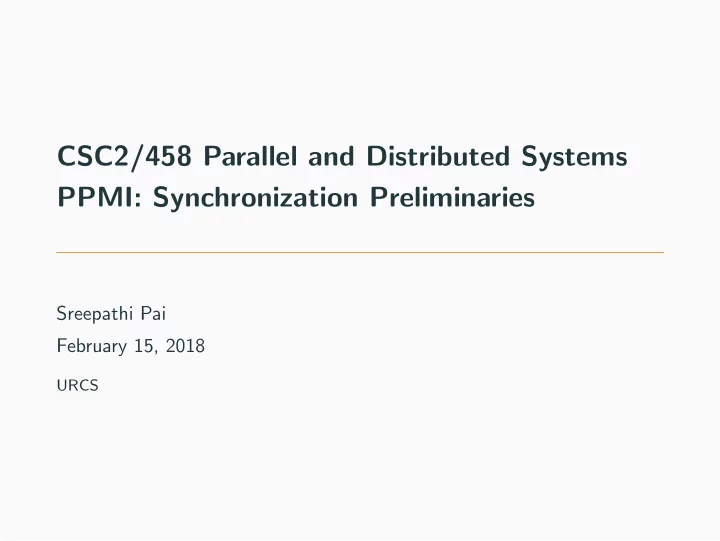

CSC2/458 Parallel and Distributed Systems PPMI: Synchronization Preliminaries Sreepathi Pai February 15, 2018 URCS
Outline Synchronization Primitives Transactional Memory Mutual Exclusion Implementation Strategies Mutual Exclusion Implementations
Outline Synchronization Primitives Transactional Memory Mutual Exclusion Implementation Strategies Mutual Exclusion Implementations
Embarrassingly Parallel Programs What are the characteristics of programs that scale linearly?
Embarrassingly Parallel Programs No serial portion. I.e., no communication and synchronization.
Critical Sections Why should critical sections be short? [A critical section is a region of code that must be executed by a single thread at a time.]
Locks tail_lock.lock() // returns only when lock is obtained tail = tail + 1 list[tail] = newdata tail_lock.unlock()
Outline Synchronization Primitives Transactional Memory Mutual Exclusion Implementation Strategies Mutual Exclusion Implementations
The Promise of Transactional Memory transaction { tail += 1; list[tail] = data; } • Wrap critical sections with transaction markers • Transactions succeed when no conflicts are detected • Conflicts cause transactions to fail • Policy differs on who fails and what happens on a failure
Implementation (High-level) • Track reads and writes • inside transactions (weak atomicity) • everywhere (strong atomicity) • Conflict when • reads and writes “shared” between transactions • these may not correspond to programmer-level reads/writes • Eager conflict detection • every read and write checked for conflict • aborts transaction immediately on conflict • Lazy conflict detection • check conflicts when transaction end • May provide abort path • taken when transactions fail
Actual Implementations How can we use cache coherence protocols to implement transactional memory?
Outline Synchronization Primitives Transactional Memory Mutual Exclusion Implementation Strategies Mutual Exclusion Implementations
Mutual Exclusion How do n processes co-ordinate to achieve exclusive access to one or more resources for themselves?
Some strategies • Take turns • Tokens • Time-based • Queue • Assume you have exclusive access and detect and resolve conflicts
Evaluating Strategies: Correctness Show that mutual exclusion is achieved (under all possible orderings). • Does strategy deadlock? • What are the conditions for deadlock? • Does strategy create priority inversions? • What is a priority inversion?
Evaluation: Performance How do we evaluate performance of, say, a particular implementation strategy for locks? • Use execution time for locking and unlocking?
Evaluation: Performance • Use throughput: Operations/Second • Vary degree of contention • I.e. change number of parallel workers • “Low contention” vs “High contention” • Operations can either be: • Application-level operations • Lock/Unlock operations
Collapse of Ticket Locks in the Linux kernel Silas Boyd-Wickizer, M. Frans Kaashoek, Robert Morris, and Nickolai Zeldovich, ”Non-scalable Locks are Dangerous”
Lock Performance Silas Boyd-Wickizer, M. Frans Kaashoek, Robert Morris, and Nickolai Zeldovich, ”Non-scalable Locks are Dangerous”
Evaluation: Fairness/Starvation Will all workers that need access to a resource get it? Consider scheduler queues with shortest-job-first scheduling.
Evaluation: Efficiency • How much storage is required? • How many operations are used? • How much do those operations cost? • Should you yield or should you spin?
Evaluation: Other Notions We will examine these notions in more detail in next two lectures: • Progress • System-wide progress (“lock-free”) • Per-thread (“wait-free”) • Resistance to failure of workers
Outline Synchronization Primitives Transactional Memory Mutual Exclusion Implementation Strategies Mutual Exclusion Implementations
Can this happen? T0 T1 a = -5 a = 10 A later read of a returns − 10.
Implementation of Locks All of the below algorithms require only read/write instructions(?): • Peterson’s Algorithm (for n = 2 threads) • Filter Algorithm ( > 2 threads) • Lamport’s Bakery Algorithm
Limitations • for n threads, require n memory locations • between a write and a read, another thread may have changed values
Atomic Read–Modify–Write Instructions • Combine a read–modify–write into a single “atomic” action • Unconditional • type sync fetch and add ( type *ptr, type value, ...) • Conditional • bool sync bool compare and swap ( type *ptr, type oldval, type newval , ...) • type sync val compare and swap ( type *ptr, type oldval, type newval , ...) • See GCC documentation sync functions are replaced by atomic functions •
AtomicCAS • (Generic) Compare and Swap • atomic cas(ptr, old, new) • writes new to ptr if ptr contains old • returns old • Only atomic primitive really required atomic_add(ptr, addend) { do { old = *ptr; } while(atomic_cas(ptr, old, old + addend) != old); }
Locks that spin/Busy-waiting locks • Locks are initialized to UNLOCKED lock(l): while(atomic_cas(l, UNLOCKED, LOCKED) != UNLOCKED); unlock(l): l = UNLOCKED; • This is a poor design • Why? • Suitable only for very short lock holds • Use random backoff otherwise (e.g. sleep or PAUSE )
Locks that yield during spinning • Locks are initialized to UNLOCKED lock(l): while(atomic_cas(l, UNLOCKED, LOCKED) != UNLOCKED) { sched_yield(); // relinquish CPU }
Performance tradeoffs of spin locks Operation Atomics Lock unbounded Unlock 0 • Remember every atomic must be processed serially!
An alternative lock – ticket lock • Each lock has a ticket associated with it • Locks and tickets are initialized to 0 lock(l): // atomic_add returns previous value my_ticket = atomic_add(l.ticket, 1); while(l != my_ticket); unlock(l): l += 1; // could also be an atomic_add
Performance tradeoffs of ticketlocks Operation Atomics Reads/Writes Lock 1 unbounded Unlock 0 1 • Variations on ticket locks are used as high-performance locks today • We’ll study some of these in next lecture.
Recommend
More recommend